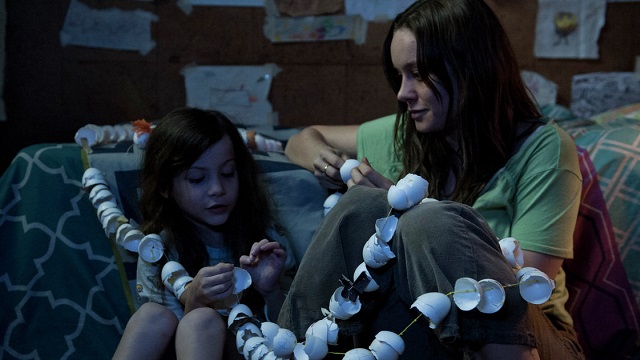I once saw a video about a couple of scientists who raised a kitten in a horizontally-striped cylinder for the first three months of its life. When the kitten was finally placed in the real world, it had no ability to grasp the outside world, and would develop in a fundamentally different way than a normal cat.
Room is the story of Jack (Jacob Trembley), a child born and raised in a single room for the first five years of his life. His mother, Joy (Brie Larson), had been kidnapped as a teenager and imprisoned by Old Nick who would come by to rape her every night. This is all that Jack knows: the room and his two connections to the outside world: the skylight, and the television. When Old Nick comes to have his way, Joy protects Jack by making him sleep in the wardrobe until Nick is gone.
Through a fantastic escape, Jack and Joy are able to escape Room, and the heart of the movie kicks in. How does Jack deal with the outside world? In Room, Jack had all the time in the world. In Room, Jack and Joy had nothing to do but talk, think, create, and build a world to cope with their situation. Outside Room, suddenly there are more people, more rooms, more spaces, more things, more sensations, and more demands. Joy has to deal with the stresses of restarting her life and of healing from the constant trauma. Jack has to rebuild his concept of the world, which now includes people outside of Ma.
The Ripped from the Headlines story at the heart of Room is potentially Lifetime Movie Network material. In a lesser movie, one could see Room easily focusing more on Ma through a warrior stance, or shifting the narrative to be more focused on Joy’s trauma at the hands of Old Nick. Screenwriter Emma Donoghue (who also wrote the original novel) and director Lenny Abrahamson are much smarter than that. Room repeatedy sets up scenes stolen from the LMN playbook, but undermines those by playing to three other emotions at once. By overwhelming the audience with every emotion at once, Room develops a beating and bleeding heart all its own.
That doesn’t mean that Room is devoid of schmaltz. One such grievous error is having Joy tell Jack that his “Strong” is within his hair. Groan-inducing and obvious, this scene gets an even cheaper recall later in the film. Worse is the marketing campaign to “Discover your Strong,” which further cheapens the simplistic schmaltzy scene. Added to this is an overdependence on Stephen Rennicks’ cloying score that intends to wring every fucking tear that doesn’t come naturally.
Despite these occasional faults, Room is an emotionally complex movie about discovery and healing. Brie Larson delivers a rock solid performance as a young traumatized mother trying her best to protect her son, but still being unable to deal with her own emotions. Jacob Trembley as Jack has the most weight to deliver; he’s best when he’s playfully figuring out the world, but stiff when he has more emotions to deliver. Together, Jacob’s stiff faults are tied to Joy’s parenting faults, making a great symbiotic relationship between actor and role and actress and role. It’s an exhausting and devastating film that plays the line of protection and exposure beautifully.

